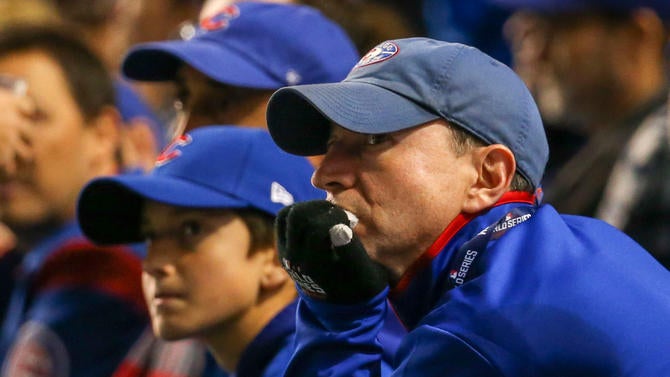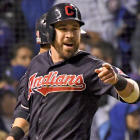CHICAGO -- Good news, Indians fans: Your team is probably going to win the World Series. Bad news, Cubs fans: Your team is probably not going to win the World Series.
You'll note the hedge word "probably" on both ends. That's for good reason. With their 7-2 win over the Cubs in Game 4 of the 2016 World Series, the Indians advanced to a 3-1 lead in the best-of-seven affair and, ergo, one win shy of the belt and title. By extension, the Cubs are only one loss away from seeing their championship drought extended to 108 years. Stated in other terms, the Indians need only win one of the next three games, while the Cubs must win three in a row.
With that still-unfolding scene laid out, let's make time for a "three-games-to-one FAQ" ...

In coin-flip terms, what are the Cubs' chances of coming back?
Assume these two teams are evenly matched and thus each has a 50 percent chance of winning a given game. That means the Cubs' "side of the coin" is going to have to come up three straight times. Simple probability tells you there's a 12.5 percent chance of that happening. There's your quick and dirty guide to the Cubs' chances of upsetting the Indians in the 2016 World Series.
How many teams have won best-of-seven postseason series after being down 3-1?
Not counting this year's Cubs, 81 teams have fallen behind 3-1 in a best-of-seven playoff series. Of those 81 teams, 12 have come back to win the series in question -- five times in World Series play. Overall, that means 14.8 percent team of teams in the Cubs' position have pulled off the comeback. At this point, you'll note that history is a bit kinder to such teams than is the coin-flip model.
What about those teams who, like the Cubs, will have to play the final two games on the road?
Good point. If the Cubs win Game 5 and extend the series, then they'll play Game 6 and if necessary Game 7 at Progressive Field in Cleveland. As it turns out, 44 teams down 3-1 have been tasked with winning the final two games away from home, and six have pulled it off. That comes to 13.6 percent of such teams. That's not as promising as those overall "down 3-1" numbers, but it's still a bit better than the coin-flip outlook.
How often does the team up 3-1 close out the series in Game 5?
Here's one for you, Tribe rooters. The Indians, as noted, need only one more win to claim their first trophy since 1948. On that front, teams up 3-1 in a best of seven win Game 5 -- and thus end the series in five games -- 49.4 percent of the time. Stated another way, those 81 teams to go up 3-1 are 40-41 in Game 5. By the narrowest majority, these series go six or seven games.
Who has the edge for Game 5?

It would seem the Cubs. They're playing at home, and they'll start Jon Lester opposite Trevor Bauer, who struggled in Game 2. As well, Terry Francona in Game 4 somewhat surprisingly called on Andrew Miller with a 7-1 lead. Miller threw 27 pitches on Saturday after throwing 17 on Friday. While he'll surely be available for Game 5, pitching three days in a row is rarely optimal for a reliever. As well, Miller's command has been a bit off during the World Series, and Dexter Fowler even reached him for a homer in Game 4. The Cubs, meantime, didn't use Pedro Strop or Aroldis Chapman on Saturday. On the other hand, maybe Danny Salazar is ready to make his presence felt in this series. Anyhow, it says here this series is going back to Cleveland.
Speaking of which, how do the numbers change if the Cubs win Game 5 and send the series back to Cleveland?
In that case, the Cubs would be down 3-2 with the final games on the road. Overall, teams down 3-2 in a best-of-seven have come back to win 29 times in 98 chances, or 29.6 percent of the time. With Games 6 and 7 on the road, a team down 3-2 has come back to win 21.3 percent of the time. Those still aren't great odds, but the Cubs will be in a substantially better situation, historically speaking, if they can just survive past Game 5.
What would be the dream scenario for the Cubs?
For the Cubs, the '96 Braves shall be their model. In the NLCS that year, they went down 3-1 to the Cardinals. What happened over the final three games of the series? The Braves utterly and completely pole-axed the Cardinals over that span, outscoring them a combined 32-1 (!) in Games 5, 6 and 7. Stated another way, over those final three games Tom Glavine tripled the RBI total of the entire Cardinals' team. If you're a Cubs fan who's partial to 3-1 comebacks that are also ritual beatings, then look to the '96 Braves for guidance.
How many times have the Indians lost three games in a row this season?
This is relevant, of course. Seven different times during the 2016 regular season the Indians lost three games in row. Most recently, it happened on Aug. 25, as they lost to the Rangers after dropping two to the Athletics. Interestingly, the Indians this season never lost more than three games in a row at any point. Given the sprawl of baseball's calendar, that's highly impressive.
How many times have the Cubs won three games in a row this season?
They won 103 games in the regular season, as you can imagine they were not strangers to win streaks. In fact, on 16 different occasions the Cubs in 2016 enjoyed win streaks of three or more games.
So are the Indians going to hang on and win this?
Yes. Unless they don't.
(Some of the data used above courtesy of WhoWins.com)






















